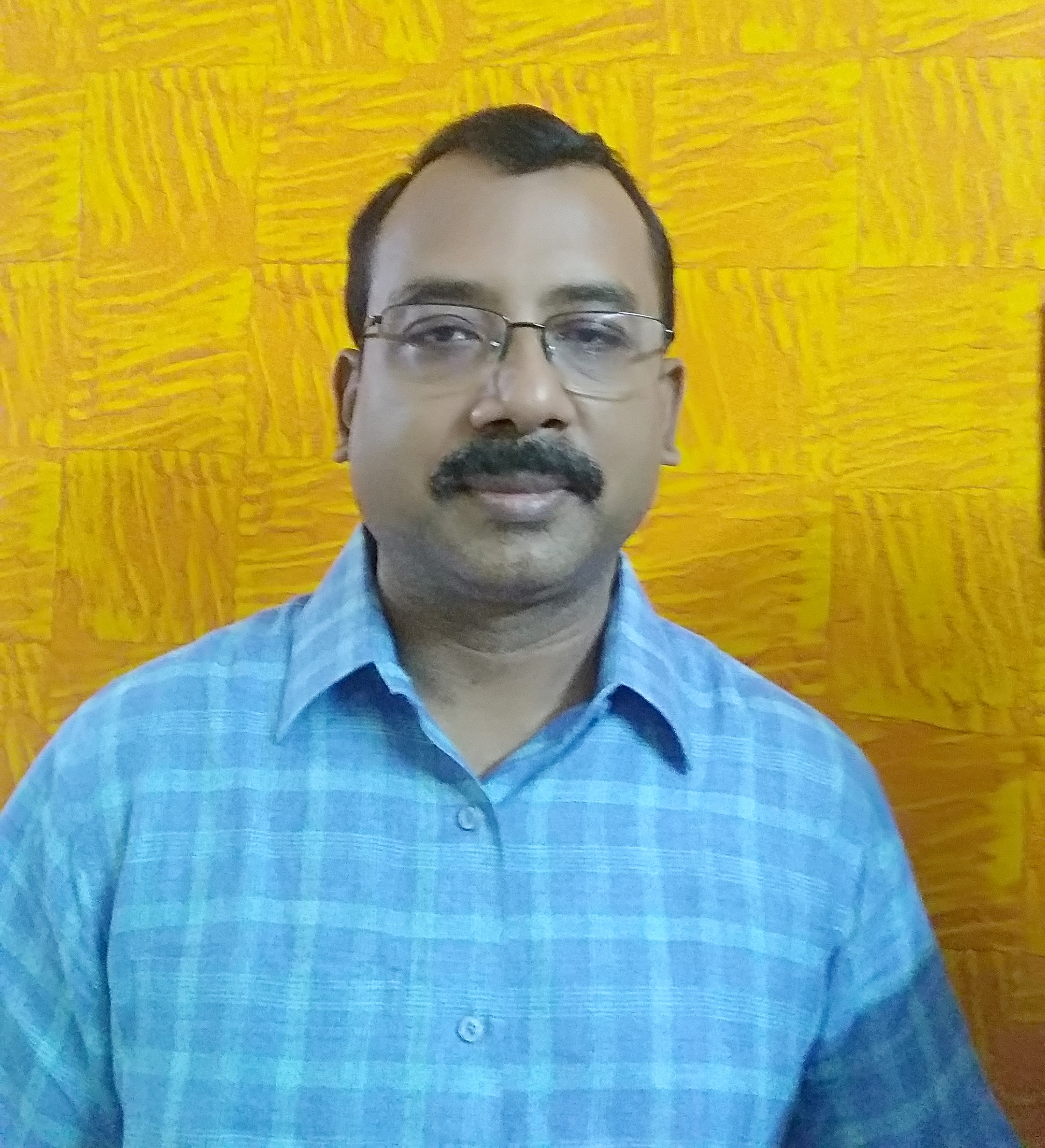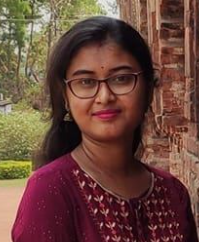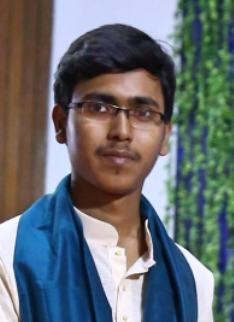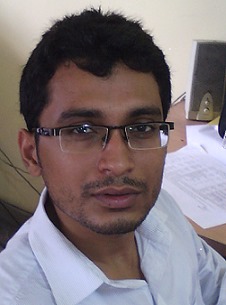
Animesh Biswas
Professor
Department: Department of MathematicsPhone Number: 9123696921
Institutional E-Mail: abiswas@klyuniv.ac.in
Web URL: na
Educational Qualifications:
M.Sc., Ph.D.
Awards and Honours (National/International)Senior Member, IEEE
Received ‘Bharat Vikas Award’
Performing Collaborative Research Project with IIT, Kharagpur
Research Area:Fuzzy Sets & Systems
Multicriteria Decision Making
Soft Computing
Artificial Intelligence
18 Years
Administrative Experiences1. Acted as The Head of the Department of Mathematics
2. Acted as an Elected Member of the Court, University of Kalyani
3. Acted as an OSD, Department of Controller of Examinations
[1] B. Sarkar and A. Biswas (2022): A multi-criteria decision making approach for strategy formulation using Pythagorean fuzzy logic, Expert Systems, Vol. 39, e. 12802 , Wiley
http://doi.org/10.1111/exsy.12802
[2] B. Sarkar and A. Biswas (2022): TODIM based Pythagorean fuzzy multicriteria group decision making through similarity measure, International Journal of Advanced Intelligence Paradigms , Vol. 22, pp. 184-199, Inderscience http://doi.org/10.1504/IJAIP.2022.10047602
[3] A. Sarkar and A. Biswas (2021): Dual Hesitant q-Rung Orthopair Fuzzy Dombi t-conorm and t-norm based Bonferroni mean Operators for solving Multicriteria Group Decision Making Problems, International Journal of Intelligent Systems, Vol. 36(7), pp. 3293-3338, Wiley
https://doi.org/10.1002/int.22417
[4] B. Ghosh and A. Biswas (2021): Status Evaluation of Provinces Affected by COVID-19: A Qualitative Assessment Using Fuzzy System, Applied Soft Computing, Vol. 109, Article ID. 107540 , Elsevier
https://doi.org/10.1016/j.asoc.2021.107540
[5] B. Sarkar and A. Biswas (2021): Pythagorean fuzzy AHP-TOPSIS integrated approach for transportation management through a new distance measure, Soft Computing, Vol. 25(5), pp. 4073-4089, Springer
https://doi.org/10.1007/s00500-020-05433-2
[6] A. Sarkar and A. Biswas (2021): Interval-valued Dual Hesitant Fuzzy Prioritized Aggregation Operators based on Archimedean t-conorm and t-norm and their Applications to Multi-Criteria Decision Making, Archives of Control Sciences, Vol. 31, pp. 213-247, Polish Academy of Sciences
https://doi.org/10.24425/acs.2021.136887
[7] B. Sarkar and A. Biswas (2021): Linguistic Einstein Aggregation Operator based TOPSIS for Multicriteria Group Decision Making in Linguistic Pythagorean Fuzzy environment, International Journal of Intelligent Systems, Vol. 36(6), pp. 2825 – 2864, Wiley
https://doi.org/10.1002/int.22403
[8] N. Deb and A. Biswas (2021): Pythagorean fuzzy Schweizer and Sklar power aggregation operators for solving multi-attribute decision making problems, Granular Computing, Vol. 6, pp. 991 – 1007, Springer
https://doi.org/10.1007/s41066-020-00243-1
[9] A. Sarkar, N. Deb and A. Biswas (2021): Uncertainty evaluations through interval-valued Pythagorean hesitant fuzzy Archimedean aggregation operators in multicriteria decision making, Intelligent Decision Technologies, Vol. 15, pp. 511–540. IOS Press
http://doi.org/10.3233/IDT-200065
[10] B. Sarkar and A. Biswas (2020): A unified method for Pythagorean fuzzy multicriteria group decision making using entropy measure, linear programming and extended technique for ordering preference by similarity to ideal solution, Soft Computing, Vol. 24, pp. 5333 – 5344, Springer
https://doi.org/10.1007/s00500-019-04282-y
[11] A. Sarkar & A. Biswas (2020): Development of Archimedean t-norm and t-conorm Based Interval Valued Dual Hesitant Fuzzy Aggregation Operators with Their application in Multicriteria Decision Making, Vol. 2, pp. 1 – 34, Engineering Reports, Wiley
https://doi.org/10.1002/eng2.12106
[12] A. Biswas & S. Kumar (2019): Intuitionistic Fuzzy Possibility Degree Measure for Ordering of IVIFNs with Its Application to MCDM, International Journal of Fuzzy System Applications, Vol. 8, No. 4, pp. 1-24, IGI Global
https://doi.org/10.4018/IJFSA.2019100101
[13] A. Biswas & S. Kumar (2019): Generalization of extent analysis method for solving multicriteria decision making problems involving intuitionistic fuzzy numbers, OPSEARCH, Vol. 56(4) pp. 1142 – 1166, Springer
https://doi.org/10.1007/s12597-019-00413-z
[14] A. Biswas and B. Sarkar (2019): Pythagorean fuzzy TOPSIS for multicriteria group decision making with unknown weight information through entropy measure, International Journal of Intelligent Systems, Vol. 34(6), pp. 1108 – 1128, Wiley
https://doi.org/10.1002/int.22088
[15] A. Sarkar and A. Biswas (2019): Multicriteria decision making using Archimedean aggregation operators in Pythagorean hesitant fuzzy environment, International Journal of Intelligent Systems, Vol. 34(7), pp. 1361-1386, Wiley
https://doi.org/10.1002/int.22099
[16] A. Biswas and B. Sarkar (2019): Interval-valued Pythagorean fuzzy TODIM approach through point operator based similarity measures for multi criteria group decision making, Kybernetes, Vol. 48 Issue: 3, pp. 496-519, Emerald Publishing
https://doi.org/10.1108/K-12-2017-0490
[17] A. Biswas and B. Sarkar (2018): Pythagorean fuzzy multi-criteria group decision making through similarity measure based on point operators, International Journal of Intelligent Systems, Vol. 33(8), pp. 1731-1744, Wiley
https://doi.org/10.1002/int.21994
[18] A. Biswas & A. K. De (2018): A Unified Method of Defuzzification for Type-2 Fuzzy Numbers with its Application to Multiobjective Decision Making, Granular Computing, Vol. 3, pp. 301 – 318, Springer
https://doi.org/10.1007/s41066-017-0068-z
[19] A. Biswas & A. K. De (2018): Correction to: A unified method of defuzzification for type-2 fuzzy numbers with its application to multiobjective decision making, Granular Computing, Vol. 3, pp. 319, Springer
https://doi.org/10.1007/s41066-018-0079-4
[20] J. Debnath, D. Majumder & A. Biswas (2018): Air quality assessment using interval type-2 weighted fuzzy inference system, Ecological Informatics, Vol. 46, pp. 133 – 146, Elsevier
https://doi.org/10.1016/j.ecoinf.2018.06.002
[21] A. Biswas & J. Debnath (2018): Analytic hierarchy process based on interval type-2 intuitionistic fuzzy sets with their application to multicriteria decision making, Intelligent Decision Technologies, Vol. 12, No. 3, pp. 359 – 370, IOS Press
https://doi.org/10.3233/IDT-180341
[22] A. Biswas and A. Sarkar (2018): Development of dual hesitant fuzzy prioritized operators based on Einstein operations with their application to multi-criteria group decision making, Archives of Control Sciences, Vol. 28, No. 4, pp. 527 – 549, Polish Academy of Sciences
https://doi.org/10.24425/acs.2018.125482
[23] A. K. De, S. Dewan & A. Biswas (2018): A Unified approach for fuzzy multiobjective Stochastic Programming with Cauchy and extreme value distributed fuzzy random variables, Intelligent Decision Technologies, Vol. 12, pp. 81 – 91, IOS Press
https://doi.org/10.3233/IDT-170312
[24] A. K. De, S. Dewan and A. Biswas (2018): Fractional Programming Methodology in Hybrid Decision Making Environment using Hexagonal Fuzzy Numbers, International Journal of Applied Engineering Research, Vol. 13(10) Spl, pp. 7 – 14
[25] A. Biswas & S. Kumar (2017): Extension of extent analysis method in intuitionistic fuzzy environment, The Journal of Fuzzy Mathematics, Vol. 25(4), pp. 759 – 772 The Institute of Fuzzy mathematics
[26] D. Majumder, A. Biswas, S. Sahu & P. Haldar (2017): Validation of questionnaires for measuring morningness of students and shift workers in Indian population using intelligent fuzzy system, Intelligent Decision Technologies. Vol. 11, pp. 265 – 273, IOS Press
https://doi.org/10.3233/IDT-170294
[27] A. Biswas & N. Modak (2017): On solving multiobjective transportation problems with fuzzy random supply and demand using fuzzy goal programming, International Journal of Operations Research and Information Systems, Vol. 8(3), pp. 54 – 81, IGI Global
http://dx.doi.org/10.4018/IJORIS.2017070104
[28] A. Biswas & N. Modak (2017): A Multiobjective Fuzzy Chance Constrained Programming Model for Land Allocation Planning in Agricultural Sector: A case study, International Journal of Computational Intelligence Systems, Vol. 10, pp. 196 – 211, Atlantis Press
http://dx.doi.org/10.2991/ijcis.2017.10.1.14
[29] D. Majumder, S. Sahu & A. Biswas (2017): A fuzzy reasoning approach for assessing morningness of individuals using reduced version of morningness-eveningness questionnaire, International Journal of Computational Intelligence Systems, Vol. 10, pp. 347 – 362, Atlantis Press
http://dx.doi.org/10.2991/ijcis.2017.10.1.24
[30] A. Biswas & A. K. De (2016): A New Methodological Development for Solving Linear Bilevel Integer Programming Problems in Hybrid Fuzzy Environment, New Trends in Mathematical Sciences, Vol. 4, pp. 180 – 192, BISKA International
http://dx.doi.org/10.20852/ntmsci.2016217828
[31] A. Biswas & A. K. De (2016): An Efficient Ranking Technique for Intuitionistic Fuzzy Numbers with Its Application to Chance Constrained Bilevel Programming, Advances in Fuzzy Systems, Vol. 2016, pp. 1 – 12, Hindawi
http://dx.doi.org/10.1155/2016/6475403
[32] J. Debnath, A. Biswas, S. Presobh, K. N. Sen & S. Sahu, (2016): Fuzzy inference model for assessing occupational risks in construction sites, International Journal of Industrial Ergonomics, Vol. 55, pp. 114 – 128, Elsevier
https://doi.org/10.1016/j.ergon.2016.08.004
[33] A. Biswas, A. Adan, P. Halder, D. Majumdar, V. Natale, C. Randler L. Tonetti, and S. Sahu (2014): Exploration of Transcultural Properties of the Reduced Version of the Morningness-Eveningness Questionnaire (rMEQ) Using Adaptive Neuro Fuzzy Inference System, Biological Rhythm Research, Vol. 45(6), pp. 955 – 968, Taylor and Francis (SCI Indexed IF: 1.216)
http://dx.doi.org/10.1080/09291016.2014.939442
[34] A. Biswas & D. Majumder (2014): Genetic Algorithm based Hybrid Fuzzy System for Assessing Morningness, Advances in Fuzzy Systems, Vol. 2014, pp. 1 – 9, Hindwai
http://dx.doi.org/10.1155/2014/732831
[35] A. Biswas & N. Modak (2013): A Fuzzy Goal Programming Technique for Multiobjective Chance Constrained Programming with Normally Distributed Fuzzy Random Variables and Fuzzy Numbers, International Journal of Mathematics in Operational Research. Vol. 5, pp. 551 – 570, Inderscience
http://dx.doi.org/10.1504/IJMOR.2013.056116
[36] D. Majumder, J. Debnath & A. Biswas (2013): Risk Analysis in Construction Sites Using Fuzzy Reasoning and Fuzzy Analytic Hierarchy Process, Procedia Technology, Vol. 10, pp. 604 – 614, Elsevier
http://dx.doi.org/10.1016/j.protcy.2013.12.401
[37] A. Biswas & N. Modak (2013): On Solving Chance Constrained Programming Problems involving Uniform Distribution with Fuzzy Parameters, Intelligent Decision Technologies. Vol. 7, pp. 151 – 159, IOS Press
http://dx.doi.org/10.3233/IDT-130158
[38] A. Biswas & S. Dewan (2012): Priority based Fuzzy Goal Programming Technique for Solving Fractional Fuzzy Goals by using Dynamic Programming. Fuzzy Information and Engineering. Vol. 4, pp. 165 – 180, Springer Verlag http://dx.doi.org/10.1007/s12543-012-0109-x
[39] A. Biswas & N. Modak (2012): Using Fuzzy Goal Programming Technique to Solve Multiobjective Chance Constrained Programming Problems in a Fuzzy Environment, International Journal of Fuzzy System Applications. Vol.2, pp. 71 – 80, IGI Global, USA
http://dx.doi.org/10.4018/IJFSA.2012010105
[40] A. Biswas & K. Bose (2011): A Fuzzy Programming Approach for Solving Quadratic Bilevel Programming Problems with Fuzzy Resource Constraints. International Journal of Operational Research. Vol. 12, pp. 142 – 156, Inderscience
http://dx.doi.org/10.1504/IJOR.2011.042503
[41] B. B. Pal & A. Biswas (2007): Fuzzy Goal Programming Approach for Solving Bilevel Decentralized Planning Problems. International Journal of Mathematical Sciences. Vol.6, pp. 391 – 401, Serial Pub.
[42] A. Biswas & B. B. Pal (2005): Application of Fuzzy Goal Programming Technique to Land Use Planning in Agricultural System. Omega. Vol. 33, pp. 391 – 398, Elsevier
http://dx.doi.org/10.1016/j.omega.2004.07.003
Edited Volumes
[43] N. Deb, A. Sarkar and A. Biswas (2022): Multi Attribute Group Decision Making through the Development of Dombi Bonferroni Mean Operators Using Dual Hesitant Pythagorean Fuzzy Data, Advances in Intelligent Systems and Computing, vol 1411, pp. 189-215, Springer
http://doi.org/10.1007/978-981-16-6887-6
[44] B. Ghosh, S. Sahu and A. Biswas (2021) A Fuzzy Logic Approach to Evaluate Discomfort of Body Parts among Female Sal Leaf Plate Makers in India, Communications in Computer and Information Science, Vol. 1406, pp. 91 – 104, Springer
https://doi.org/10.1007/978-3-030-75529-4_8
[45] S. Gayen and A. Biswas (2021) Pythagorean Fuzzy C-means Clustering Algorithm, Communications in Computer and Information Science, Vol. 1406, pp. 118 – 130, Springer
https://doi.org/10.1007/978-3-030-75529-4_10
[46] A. Sarkar & A. Biswas (2020): Hesitant-Intuitionistic Trapezoidal Fuzzy Prioritized Operators Based on Einstein Operations with Their Application to Multi-criteria Group Decision-Making, Studies in Computational Intelligence, Vol. 870, pp. 1 – 24, Springer
https://doi.org/10.1007/978-981-15-1041-0_1
[47] S. Kumar & A. Biswas (2019): A Unified TOPSIS approach to MADM problems in interval-valued intuitionistic fuzzy environment, Advances in Intelligent Systems and Computing, Vol. 799, pp. 435 – 447, Springer
https://doi.org/10.1007/978-981-13-1135-2_33
[48] S. Kumar & A. Biswas (2019): Linear Programming-Based TOPSIS Method for Solving MADM Problems with Three-Parameter IVIFNs, Studies in Computational Intelligence, Vol. 687, pp. 1 – 25, Springer
https://doi.org/10.1007/978-981-10-8974-9_1
[49] A. Sarkar and A. Biswas (2019): On Developing interval-valued dual hesitant fuzzy Bonferroni mean aggregation operator and their application to multi-criteria decision making, Communications in Computer and Information Science, Vol. 1030, pp. 27-46, Springer
https://doi.org/10.1007/978-981-13-8578-0_3
[50] A. Biswas & S. Kumar (2018): An integrated TOPSIS approach to MADM with interval-valued intuitionistic fuzzy settings, Advances in Intelligent Systems and Computing, Vol. 706, pp. 533 – 543, Springer
https://doi.org/10.1007/978-981-10-8237-5_52
[51] J. Debnath & A. Biswas (2018): Assessment of Occupational Risks in Construction Sites using Interval Type-2 Fuzzy Analytic Hierarchy Process, Lecture Notes in Networks and Systems, Vol. 11, pp. 283 – 297, Springer
http://dx.doi.org/10.1007/978-981-10-3953-9_28
[52] D. Majumder, J. Debnath and A. Biswas (2017): Interval type-2 Mamdani fuzzy inference system for morningness assessment of individuals, Advances in Intelligent Systems and Computing, Vol. 517, pp. 679 – 693, Springer
https://doi.org/10.1007/978-981-10-3174-8_57
[53] S. Kumar & A. Biswas (2017): Use of possibility measures for ranking of interval valued intuitionistic fuzzy numbers in solving multicriteria decision making problems, Communications in Computer and Information Science, Vol. 776, pp. 153 – 167, Springer Verlag
https://doi.org/10.1007/978-981-10-6430-2_13
[54] A. Biswas & A. K. De (2016): A Fuzzy Goal Programming Approach for Solid Waste Management under Multiple Uncertainties, Procedia Environmental Sciences, Vol. 35, pp. 245 – 256, Elsevier
http://dx.doi.org/10.1016/j.proenv.2016.07.090
[55] A. Biswas & A. K. De (2015): An Efficient Technique for Solving Fully Fuzzified Multiobjective Stochastic Programming Problems, Advances in Intelligent Systems and Computing, Vol. 339, pp. 497-509, Springer Verlag
http://dx.doi.org/10.1007/978-81-322-2250-7_49
[56] N. Modak & A. Biswas (2014): A Fuzzy Programming Approach for Bilevel Stochastic Programming, Advances in Intelligent Systems and Computing, Vol. 236, pp. 125 – 136, Springer Verlag
http://dx.doi.org/10.1007/978-81-322-1602-5
[57] A. Biswas & A. K. De (2014): On Solving Multiobjective Quadratic Programming Problems in a Probabilistic Fuzzy Environment, Advances in Intelligent Systems and Computing, Vol. 335, pp. 543 – 557, Springer Verlag
http://dx.doi.org/10.1007/978-81-322-2217-0_44
[58] A. Biswas & A. K. De (2013): Quadratic Fuzzy Bilevel Chance Constrained Programming with Parameters Following Weibull Distribution, Lecture Notes in Computer Science, Vol. 8298, pp. 406–418, Springer Verlag. http://dx.doi.org/10.1007/978-3-319-03756-1_37
[59] A. Biswas & N. Modak (2012): A Fuzzy Goal Programming Approach for Fuzzy Multiobjective Stochastic Programming through Expectation Model. Communications in Computer and Information Science. Vol. 283, pp. 124 – 135, Springer Verlag
http://dx.doi.org/10.1007/978-3-642-28926-2_14
[60] A. Biswas & K. Bose (2012): Application of Fuzzy Programming Method for Solving Nonlinear Fractional Programming Problems with Fuzzy Parameters. Communications in Computer and Information Science. Vol. 283, pp. 104 – 113, Springer Verlag
http://dx.doi.org/10.1007/978-3-642-28926-2_12
[61] A. Biswas & A. K. De (2012): A Fuzzy Programming Method for Solving Multiobjective Chance Constrained Programming Problems involving Log-Normally Distributed Fuzzy Random Variables, Lecture Notes in Computer Science, Vol. 7677, pp.442 – 450, Springer Verlag http://dx.doi.org/10.1007/978-3-642-35380-2_52
[62] A. Biswas, D. Majumdar & S. Sahu (2011): Assessing Morningness of a Group of People by using Fuzzy Expert System and Adaptive Neuro Fuzzy Inference Model. Communications in Computer and Information Science. Vol. 140, pp. 47 – 56, Springer Verlag
http://dx.doi.org/10.1007/978-3-642-19263-0_6
[63] A. Biswas & N. Modak (2011): A Fuzzy Goal Programming Method for Solving Chance Constrained Programming with Fuzzy Parameters. Communications in Computer and Information Science. Vol. 140, pp. 187 – 196, Springer Verlag
http://dx.doi.org/10.1007/978-3-642-19263-0_23
[64] A. Biswas & B. B. Pal (2004): A Fuzzy Multilevel Programming Method for Hierarchical Decision Making. Lecture Notes in Computer Science. Vol. 3316, pp. 904 – 911, Springer Verlag.
http://dx.doi.org/10.1007/978-3-540-30499-9_139
Book
A. Biswas, A. K. De (2019) Multi-objective Stochastic Programming in Fuzzy Environments, IGI Global
ISBN: 978-15222583011
Link to Purchase:
https://www.flipkart.com/multi-objective-stochastic-programming-fuzzy-environments/p/itmfe87kbmyhvt2p
Book Chapters/ Conference Proceedings
[65] N. Deb and A. Biswas (2021): On Developing Pythagorean fuzzy Dombi geometric Bonferroni mean operators with their application to multicriteria decision making, pp. 209 – 234, In: Garg H. (eds) Pythagorean Fuzzy Sets. Springer
https://doi.org/10.1007/978-981-16-1989-2_9
[66] A. Sarkar and A. Biswas (2021): Maclaurin Symmetric Mean-based Archimedean Aggregation operators for Aggregating Hesitant Pythagorean fuzzy elements and their applications to multicriteria decision making, pp. 329 – 365, In: Garg H. (eds) Pythagorean Fuzzy Sets. Springer
https://doi.org/10.1007/978-981-16-1989-2_14
[67] B. Ghosh, S. Sahu & A. Biswas (2020) Development of Fuzzy Decision Support System to Deal with Uncertainties in Working Posture Analysis using Rapid Upper Limb Assessment, Deep Learning Techniques for Biomedical and Health Informatics (ISBN 9780128190616), B. Agarwal, V.E. Balas, L.C. Jain, R.C. Poonia and M. Sharma (Eds.), pp. 119 – 140, Elsevier
https://doi.org/10.1016/B978-0-12-819061-6.00005-7
[68] S. Kumar & A. Biswas (2018): TOPSIS based on linear programming for solving MADM problems in interval-valued intuitionistic fuzzy settings, In: Proceedings of 4th IEEE International Conference on Recent Advances in Information Technology (RAIT), pp. 458–463 IEEE
[69] B. B. Pal, R. Sophia & A. Biswas (2017): Chance Constrained Fuzzy Goal Programming with Penalty Functions for Academic Resource Planning in University Management using Genetic Algorithm (Book Chapter of Nature-Inspired Computing and Optimization) pp. 449 – 474, Springer
http://dx.doi.org/10.1007/978-3-319-50920-4_18
[70] A. Biswas & A. K. De (2017): On Development of a Fuzzy Stochastic Programming Model with its Application to Business Management (Book Chapter of Advanced Data Mining Techniques and Applications for Business Intelligence) pp. 353 – 378, IGI Global
http://dx.doi.org/10.4018/978-1-5225-2031-3.ch021
[71] A. Biswas & A. K. De (2016): Multiobjective Linear Programming Model having Fuzzy Random Variables Following Joint Extreme Value Distribution. In Proceedings of 2016 International Conference On Data Mining and Advanced Computing (SAPIENCE 16), pp. 382 – 386, IEEE Explore
[72] A. Biswas, K. Bose & S. Dewan (2013): A Fuzzy Goal Programming Approach for Quadratic Multiobjective Bilevel Programming under Fuzzy Environment. In: Proceedings of the International Conference on Information, Communication and Embedded Systems (ICICES 2013), pp. 1173 – 1178, IEEE
http://dx.doi.org/10.1109/ICICES.2013.6508167
[73] A. Biswas & K. Bose, (2013): A Fuzzy Goal Programming Technique for Quadratic Multiobjective Multilevel Programming, In Proceedings of the 2013 IEEE International Conference on Fuzzy Systems (FUZZ IEEE 2013), Hyderabad, India, pp. 1 – 8, IEEE
http://dx.doi.org/10.1109/FUZZ-IEEE.2013.6622479
[74] A. Biswas & A. K. De (2013): A Priority based Fuzzy Programming Approach for Multiobjective Probabilistic Linear Fractional Programming, In Proceedings of the 2013 IEEE International Conference on Fuzzy Systems (FUZZ IEEE 2013), Hyderabad, India, pp. 1 – 6, IEEE
http://dx.doi.org/10.1109/FUZZ-IEEE.2013.6622467
[75] A. Biswas & N. Modak (2013): A Unified Approach for Fuzzy Multiobjective Chance Constrained Programming with Joint Normal Distribution, In: Proceedings of World Congress on Engineering and Computer science 2013 (WCECS 2013), San Francisco, USA, pp. 566 – 571, Newswood Ltd.
http://www.iaeng.org/publication/WCECS2013/WCECS2013_pp566-571.pdf
[76] A. Biswas & K. Bose (2011): Fuzzy Goal Programming Approach for Quadratic Fractional Bilevel Programming. In: Proceedings of the 2011 International Conference on Scientific Computing (CSC 2011), pp. 143 – 149, CSREA Press, USAhttp://dx.doi.org/
[77] A. Biswas & K. Bose (2011): On Solving Bilevel Programming Problems with Fuzzy Parameters through Fuzzy Programming. In: Proceedings of the International Congress on Productivity, Quality, Reliability, Optimization and Modeling (ICPQROM 2011), pp. 229 – 242, Allied Publishers, New Delhi
[78] A. Biswas & N. Modak (2011): Use of Priority based Fuzzy Goal Programming Approach for Fuzzy Multiobjective Chance Constrained Programming Model. In: Proceedings of the International Congress on Productivity, Quality, Reliability, Optimization and Modeling (ICPQROM 2011), pp. 243 – 253, Allied Publishers, New Delhi
[79] A. Biswas & K. Bose (2010): A Fuzzy Goal Programming Technique for Solving Fully Fuzzified Quadratic Bilevel Constrained Programming Problems. In: Proceedings of International Conference on Operations and Management Sciences (ICOMS-2010). pp. 144 – 152, Excel India Publishers, India
1. The 2011 World Congress in Computer Science, Computer Engineering, and Applied Computing (WORLDCOMP’11), Las Vegas, USA, July 18-21, 2011
2. International Conference on Logic, Information, Control and Computation (ICLICC 2011), Gandhigram Rural Institute – Deemed University, February 25 – 27, 2011
3. International Conference on Mathematical Modelling and Scientific Computation (ICMMSC 2012), Gandhigram Rural Institute – Deemed University, March 16 – 18, 2012
4. The World Congress on Engineering and Computer Science (WCECS 2013), University of California, Berkeley, USA, October 23 – 25, 2013
5. International Conference on Swarm, Evolutionary and Memetic Computing (SEMCCO 2013), SRM University, Chennai, December 19 – 21, 2013
6. 4th International Conference on Soft Computing for Problem Solving (SocPros 2014), National Institute of Technology, Silchar, Assam, India, December 27 – 29, 2014
7. The 2nd Conference on Operations Research and Fuzziology (ORF 2016), Bangkok, Thailand, January 14 – 16, 2016
| Sl. No | Grant Agency | Title of The Project | Duration / Tenure | Total Cost of The Project |
|---|---|---|---|---|
| 1 |
Department of Science and Technology |
Multicriteria Decision Making in Type-2 Fuzzy Environments |
2019-23 |
18.30 Lakh |
Senior Member:
1. IEEE
2. Computational Intelligence Society
3. International Economics Development Research Center (IEDRC)
Life Member:
4. Indian Statistical Institute, Kolkata
5. Operational Research Society of India
6. Tripura Mathematical Society, India
Member:
7. World Academy of Science, Engineering and Technology (WASET)
8. International Association of Engineers (IAENG)
9. Soft Computing Research Society, India
10. Multicriteria Decision Making Society, Germany
11. Society for Industrial and Applied Mathematics (SIAM)
12. European Society for Fuzzy Logic and Technology (EUSFLAT)
SCOPUS ID https://www.scopus.com/authid/detail.uri?authorId=7202059748
Google Scholar ID https://scholar.google.com/citations?hl=en&user=6dUn820AAAAJ
Research Supervision
Awarded: 8
Ongoing: 4
| Sl. No | Name | Photo | Current Status |
|---|---|---|---|
| 1 | Ms. Nayana Deb |

|
Ongoing |
| 2 | Mr. Souvik Gayen |

|
Ongoing |
| 3 | Mr. Bappaditya Ghosh |

|
Awarded |
| 4 | Mr. Arun Sarkar |

|
Awarded |
| 5 | Mr. Biswajit Sarkar |

|
Awarded |
| 6 | Dr. Joy Debnath |

|
Awarded |
| 7 | Dr. Samir Kumar |

|
Awarded |
| 8 | Dr. Arnab Kumar De |

|
Awarded |
| 9 | Dr. Debasish Majumder |

|
Awarded |
| 10 | Dr. Nilkanta Modak |

|
Awarded |
New

